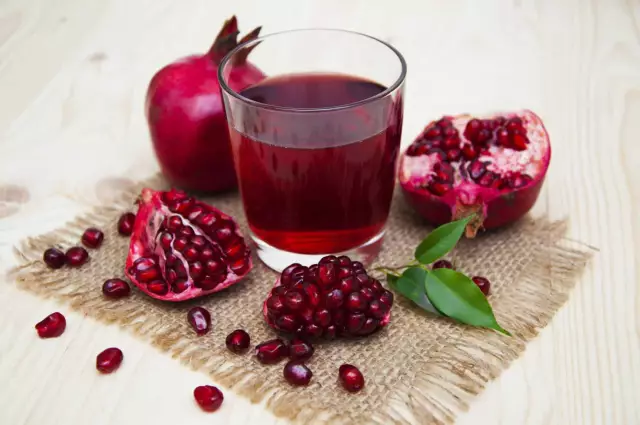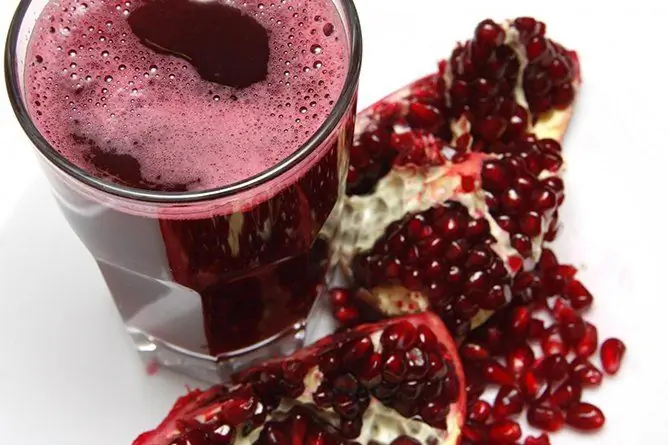- Author Rachel Wainwright wainwright@abchealthonline.com.
- Public 2023-12-15 07:39.
- Last modified 2025-11-02 20:14.
Pomegranate juice
Pomegranate juice is a valuable food product that preserves all the medicinal properties of fresh fruits. Pomegranate belongs to one of the most ancient edible fruits and medicinal plants that were known to people.

The pomegranate tree is called royal not only because of its beauty, but also because almost all of its parts - branches, bark, leaves and fruits can be used for medicinal purposes. Many of the beneficial properties were known to people in ancient times. According to historical records, Hippocrates used pomegranate juice to treat many ailments, especially nervous system disorders and fever, as well as stomach pains.
Pomegranate juice is especially popular in the countries of Central Asia, where there is a legend that it was transfused instead of blood to a wounded warrior. In the mythology of many peoples of the world, pomegranate symbolizes eternal life and abundance.
Pomegranate juice has a pleasant sweet and sour taste and is easily absorbed by the body.
Composition of pomegranate juice
Pomegranate seeds are extremely rich in many beneficial substances. Pomegranate juice contains:
- 14.2 g of carbohydrates;
- 0.3 g protein;
- 0.1 g fat;
- 2.4 g of organic acids (most of all contain citric acid, which determines the taste of the juice);
- 0.2 g dietary fiber;
- 14.2 g of mono - and disaccharides;
- 82.5 g of water;
- 0.3 g of ash.
The beneficial properties of pomegranate juice are due to its composition:
- Vitamins - PP, B2, A, B1, C, E and folacin (folic acid in its natural form);
- Macronutrients - sodium, calcium, magnesium, phosphorus and potassium;
- Trace elements - iron, iodine and copper;
- Phytoncides;
- Nitrogenous substances;
- Water-soluble polyphenols;
- Saccharides;
- Tanning and pectin substances;
- Tannins;
- Amino acids (essential and non-essential).
The biological activity and medicinal properties of pomegranate juice is much higher than that of most other fruit and berry juices, which makes it one of the most valuable food products.
Useful properties of pomegranate juice
Thanks to vitamins E, PP, A, ascorbic acid and B vitamins, pomegranate juice is useful:
- With vitamin deficiency;
- As a vitamin support for a weakened body for recovery after serious illnesses and operations.
Pomegranate juice is of particular value for pregnant women, especially in the early stages, since all the vitamins contained in it are easily absorbed by the body. It is also recommended to include it in the daily diet of nursing mothers, children and the elderly.
The minerals in pomegranate juice contribute to:
- Ensuring the flawless functioning of the circulatory system;
- Improving bone tissue;
- Improving the quality of the blood composition by affecting the hemoglobin level.
The organic acids found in pomegranate juice are powerful antioxidants that slow down aging and reduce the risk of heart disease.
The benefits of pomegranate juice
Scientists at the University of California have found that fresh pomegranate juice blocks oxidative processes in the body more effectively than green tea, red wine and other juices (orange, grape and blueberry). Also, scientists from this university have revealed the ability of pomegranate juice to slow down the growth of a malignant tumor in prostate cancer.
Israeli specialists have proven the benefits of pomegranate juice to destroy infections in the kidneys, while a similar effect may not be caused by a specific substance, but due to their unique combination.
Pomegranate juice is useful as a diuretic to relieve edema, while it does not wash out potassium from the body, like many synthetic diuretics, but rather saturates the body with it. This property is especially useful for heart patients and hypertensive patients, since the juice from pomegranate seeds helps to normalize blood pressure in hypertension.
Also, as a result of many studies, the benefits of pomegranate juice for men have been proven. It not only replenishes the reserves of vitamins and saturates the body with the necessary minerals, but also, by improving blood circulation, in combination with physical activity and a healthy diet, helps to restore potency.
Pomegranate juice has the ability to slightly thicken the blood, so it is used to treat prolonged uterine bleeding.
Application of pomegranate juice
Fresh juice from pomegranates can be squeezed out with or without special juicers. To do this, the ripe fruit in the peel must be kneaded with your hands, then cut off the crust and squeeze out the juice. It is believed that juice from fruits with dark, almost burgundy grains is especially useful.

Pomegranate juice can be included in various diets, and the combination with beetroot and carrot juice turns it into a vitamin and mineral cocktail.
There are also various recipes for using pomegranate juice in the treatment of various diseases:
- With gastrointestinal disorders and anemia, you should drink half a glass of juice half an hour before meals three times a day. In this case, it is necessary to adhere to an appropriate diet that prevents constipation. Such treatment can be carried out for a long time - from 2 to 4 months;
- With angina and stomatitis, it is recommended to gargle with warmed pomegranate juice;
- To normalize the production of hormones by the ovaries in case of menstrual irregularities, it is recommended to drink one glass of pomegranate juice in the first 7-10 days of the cycle;
- To cleanse the body of metabolic products and toxins, pomegranate juice should be drunk daily for three weeks. Moreover, in the first week - three times a day, in the second - twice a day, and during the third week - once a day.
Also, juice from pomegranate seeds, 50-120 ml per day, is recommended to drink at:
- Poor appetite;
- Swelling and congestion of bile;
- Cardiovascular diseases.
Outwardly, the properties of pomegranate juice are used in the treatment of burns and wounds, using it diluted in half with water for compresses and lotions.
Pomegranate juice is widely used by chefs all over the world. The evaporated juice is the basis of one of the most famous sauces of oriental cuisine - narsharab, which is served with fish and meat dishes. Also, juice is used in marinades for meat, due to which they acquire a special tenderness.
Harm of pomegranate juice
With all the beneficial properties, the harm of pomegranate juice can occur against the background of various diseases. So, it is not recommended to use it when:
- Ulcerative lesions of the mucous membranes of the digestive organs;
- Hemorrhoids
- Constipation.
Pomegranate juice can also be harmful when consumed in excessive quantities. With gastritis, pancreatitis and increased acidity of gastric juice, you can drink it in small quantities.
In addition, it should be borne in mind that organic acids present in pomegranate juice destroy tooth enamel, and therefore dentists recommend drinking it with diluted water, and after drinking the juice, rinse the mouth cavity.
Found a mistake in the text? Select it and press Ctrl + Enter.






